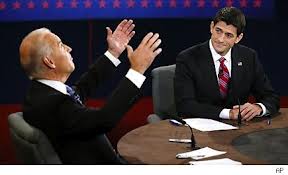
Joe Biden might be the most enigmatic person in politics right now, and he’s the Vice President of the United States.
In the debate on October 11, Biden squared off against vice presidential candidate Paul Ryan on a wide berth of issues—ranging from controversial issues regarding national security to domestic problems.
Starting with national security, the two debated Libya, Iraq, and Afghanistan. Biden was a little strung up on Libya, but after that he pressed hard on Romney and Ryan’s idea that the troops’ pullout date of the summer is not a definite date. Biden enforced Obama’s accomplishment of finding Bin Laden a top priority, as well as the president’s strong relationship with “Bebe” Netanyahu when Ryan questioned his foreign policy.
What was surprising about the foreign policy debate was how the facts were presented: Biden’s effervescent attitude was supplemented with a wide knowledge of facts; at one point, both him and Ryan were debating Afghan provinces in which the fighting was most dangerous. What’s interesting is not the fact that the self-proclaimed “nerd” Ryan was able to spout facts; rather, it was Biden’s preparedness that was shocking. Biden, known for his impulsive mouth, was able to dispute Ryan’s facts with facts of his own, something nobody believed he was able to do.
The topics were then shifted to domestic policies, the most talked about being tax rates, deficit spending, and health care policy. Biden railed on Romney’s “47%” comments, questioning the validity of a president who says he only cares about half of America’s people. Ryan’s defense was not much of a defense—how could you defend those statements??—but a statement of regret, saying that Romney’s comments were not heartfelt and did not reflect his attitudes towards the American people. Biden also was harsh on Romney’s tax rate and how it is double the rate that most middle-class families pay, something Ryan defended, with the Republicans’ tax plan to further lower taxes on the upper class, with statements about the unemployment rate, and how less taxes on the upper class would allow them to create more private sector jobs, and lower the unemployment rate.
With the tax rate policies having a lot to do with deficit spending and government intake, the topic was a clean transition to the deficit and the budget. Biden had the edge with regards to tax policies, as the Obama-Biden plan to increase taxes on the upper class millionaires would bring in a sizable amount of money that would go towards paying off the debt that America has, while Ryan’s tax plan would obviously decrease federal income tax intake. However, both parties need to be reasonable on this issue; bipartisanship is key. Republicans who have signed the Grover Norquist pledge and think that an increase in an already overly ridiculous defense budget can not be serious about deficit reduction; they have to concede that those could be the biggest holes to fill in their arguments. Likewise, Democrats have to realize that domestic/defense spending will have to be cut somewhere, and not the meager 50 annual billion dollar automatic cuts scheduled to be siphoned off the defense budget.
The defense budget is a huge misconception: Ryan said during the debate that America is less safe during the Obama Administration, largely due to this 50 billion budget cut. Although this may look like a large figure to the American people, a 50 billion dollar cut to a 1.08 trillion is only a 5 percent annual cut. Right now, the United States’ defense budget is more than every other country’s defense budget, in the world, combined. This comes at a time when all of the great powers are demilitarized, and China, the world’s new ‘naval superpower’, has one aircraft carrier, with no planes on it. Do we really need to spend so much money on the military to compete with this naval superpower? The amount of money being spent on the military could actually be one of the causes of our problems.
The moderator was much more provocative than she should have been, inciting powerful reaction from both of the candidates. With regards to taxes, she was especially hard on Ryan’s policies—or lack thereof—questioning the specifics of his plans or just questioning the morality of tax cuts for the wealthiest Americans. After Jim Lehrer’s boring and passive performance in the Obama-Romney debate, Martha Raddatz was probably told to be more lively and incite more disagreement, but she overstepped her boundary several times, forcing both candidates—Ryan, for the most part—to argue with her instead of their actual opponent.
Although Raddatz was admittedly slanted in criticizing Ryan harsher than Biden, it was not her fault that Ryan lost — it was Biden’s: Biden was smiling, laughing, waving his hands around, interrupting, and overall annoying, but it was effective. Ryan was thrown off more than once after a Biden interruption; Biden forced Ryan to address Biden’s points while still trying to make the point he was attempting to make, throwing off Ryan’s rhythm and looking stronger in his arguments.
And although Biden was ultimately the victor in the debate, it hardly matters. Only 41 million Americans sat down and watched the debate, down from last elections’ 70 million viewers, largely to watch Sarah Palin. What really matters here were the issues, and how each person presented their ideas — the winning party rarely means much. The big event will be the next presidential debate tonight, to see if Obama can keep the pace that Biden set, or if he will regress to the passive, tired Obama that we saw the last time.








